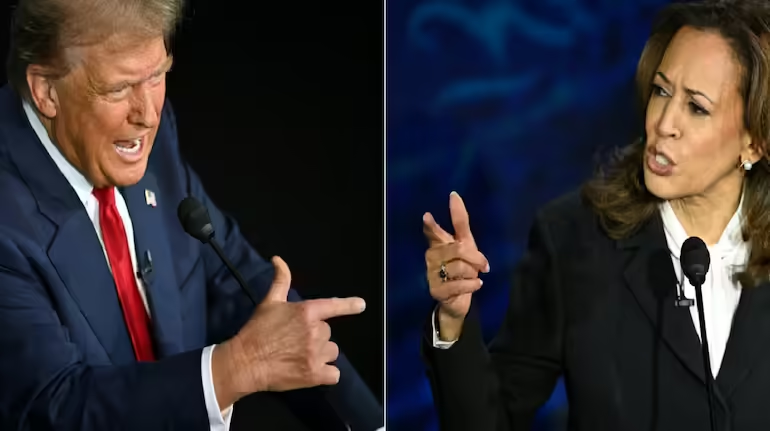Trump’s assertion that there was widespread bipartisan support to overturn Roe v. Wade was refuted by Harris, who called his ideas “Trump abortion bans” that made no allowances for rape or incest.
Vice President Kamala Harris attacked former President Donald Trump on September 10 in a heated presidential debate, accusing him of spreading false information and “insulting the women of America” with his remarks and policies about abortion. Raising an eyebrow with his “Trump abortion bans” that don’t make an exemption for rape or incest, Harris refuted Trump’s claim that there is bipartisan support to overturn Roe v. Wade. She highlighted the hardships faced by women who are denied access to basic healthcare and emphasized the serious repercussions of such prohibitions.
The vice president made the accusation that Trump intended to implement a nationwide ban on abortions if re-elected; the former president has categorically refuted this. He maintained that state governments should continue to make these decisions. In response to a question on whether he would veto a federal abortion ban, Trump stated that Congress would not approve the legislation in question.
With a pointed jab at the outgoing president, Harris said, “There are now Trump abortion prohibitions in over 20 states, which make it illegal for a doctor or nurse to deliver healthcare. It offers life in prison in one state. Trump’s abortion restrictions are all-inclusive, meaning that victims of crimes against their bodies do not have the right to decide what happens to them. This includes rape and incest.
She said, “Next, that is immoral, and one does not have to abandon their faith or deeply held beliefs to agree the government and Donald Trump certainly should not be telling a woman what to do with her body”
Harris pointed out that the Guttmacher Institute reports that since Roe v. Wade was overturned in 2022, at least 14 states have outlawed abortion completely and 27 have placed limitations on pregnancy. Trump, who applauded the judges he nominated to the Supreme Court’s ruling, contended that state governments should be in charge of regulating abortion rights and rejected the idea of a federal prohibition.
“But be aware that Donald Trump would sign a national abortion ban if he were to win reelection. Recognize that his project 2025 would include a nationwide ban on abortion,” she continued.
Sharply criticizing Trump’s ability to enact a national abortion ban as detailed in his Project 2025, Harris pledged to reinstate Roe v. Wade if elected. “I pledge to you when Congress passes a bill to put back in place the protections of Roe v Wade, as President of the United States, I will proudly sign it into law,” Harris added.
She emphasized the significance of defending reproductive rights and made the case that individual choices regarding one’s own body should not be governed by the government.
Harris questioned Trump at their Philadelphia debate about the effect his Supreme Court picks had in overturning Roe v. Wade, which she referred to as “Trump abortion bans.” Despite many state laws having few or no exceptions, Trump defended his position by saying that he supported exceptions for cases of rape, incest, or threats to the mother’s life.
With regard to abortion, Trump presented his actions as a major accomplishment, saying, “This issue has torn our country apart for 52 years. I accomplished something that no one could have predicted.”
But Harris denounced Trump for disseminating misinformation regarding abortion. “A woman in America does not come to term with her pregnancy and then beg for an abortion. That isn’t taking place. “It’s demeaning to American women,” Harris said, denouncing Trump’s assertions as deceptive and impolite.
In addition, Trump avoided answering the question of whether he would veto a national abortion ban by saying, “I didn’t discuss it with JD, in all fairness,” even though Senator JD Vance, his running mate, had already declared he would. “I’m not signing a ban and there’s no reason to sign a ban,” declared Trump subsequently.
Using her experience as a prosecutor, Harris denounced the severe repercussions of the state’s current abortion prohibitions. “Know what that means: a survivor of a crime of violation to their body does not have the right to make a decision about what happens to their body next,” she said, describing the terrible consequences and labeling such circumstances as “immoral.” Harris brought attention to situations in which teenage incest victims might be forced to carry their pregnancies to term and in which women with health issues might find it difficult to acquire the care they need.
In the 2024 election cycle, reproductive rights have become a major issue. On November 5, 10 states are slated to vote on abortion rights. The Vice President, taking advantage of the broad popular support for abortion access, has made this topic the focal point of her campaign.
In the first presidential debate on September 10, which took place in Philadelphia, Pennsylvania at 9:00 p.m. Eastern Time (01:00 GMT), Democratic nominee Harris and Republican opponent Trump squared off. Eight weeks remain before the November 5 general elections in the United States.
During their meeting, Trump and Harris laid out their diametrically opposed plans for the nation. The Democratic Vice President took use of the occasion to address Trump about his repeated fabrications and to press him about his denial of the results of the 2020 election. Trump’s reaction consisted of his usual digressions and personal jabs, which his advisors have been trying to control.




